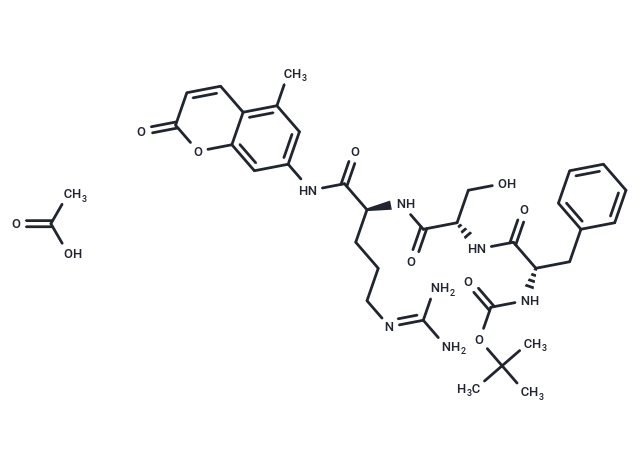Shopping Cart
- Remove All
 Your shopping cart is currently empty
Your shopping cart is currently empty

Trypsin is a serine protease that can be isolated from fish to hydrolyze lysine or arginine carboxy-side proteins. With the anti-inflammatory activity, Trypsin could induce the cell membrane fusion of PDCoV-infected cells through the interaction between the S glycoprotein of PDCoV and pAPN, activate PAR2 and PAR4, and promote cell proliferation and differentiation. Trypsin can be used to promote wound healing and study neurogenic inflammation.

| Pack Size | Price | Availability | Quantity |
|---|---|---|---|
| 100 mg | $39 | In Stock | |
| 500 mg | $89 | In Stock | |
| 1 g | $133 | In Stock |
| Description | Trypsin is a serine protease that can be isolated from fish to hydrolyze lysine or arginine carboxy-side proteins. With the anti-inflammatory activity, Trypsin could induce the cell membrane fusion of PDCoV-infected cells through the interaction between the S glycoprotein of PDCoV and pAPN, activate PAR2 and PAR4, and promote cell proliferation and differentiation. Trypsin can be used to promote wound healing and study neurogenic inflammation. |
| In vitro | Trypsin (10, 50 ng/mL; 12 h) enhances PDCoV cell-to-cell spread in LLC-PK cells by promoting membrane fusion in LLC-PK cells.[2] Trypsin (0.05%; 3 h) promotes C6 glioma cell proliferation in serum-free and growth factor-free medium.[3] Trypsin (20 -150 ng/mL; 5 days) potentiates PBMC differentiation.[4] |
| In vivo | Trypsin, when administered intradermally at doses of 100 to 500 μg per site in 50 μL of saline, elicits scratching behavior in mice.[5] |
| Cas No. | 9002-07-7 |
| Smiles | [#6]-[#6](-[#8])=O.[#6]-c1cc(-[#7]-[#6](=O)-[#6@H](-[#6]-[#6]-[#6]\[#7]=[#6](\[#7])-[#7])-[#7]-[#6](=O)-[#6@H](-[#6]-[#8])-[#7]-[#6](=O)-[#6@H](-[#6]-c2ccccc2)-[#7]-[#6](=O)-[#8]C([#6])([#6])[#6])cc2oc(=O)ccc12 |
| Relative Density. | 1.37 g/cm3 at 20℃ |
| Storage | Powder: -20°C for 3 years | In solvent: -80°C for 1 year | Shipping with blue ice. |
| Solubility Information | DMSO: 90.0 mg/mL, Sonication and heating to 60℃ are recommended. |

Copyright © 2015-2025 TargetMol Chemicals Inc. All Rights Reserved.